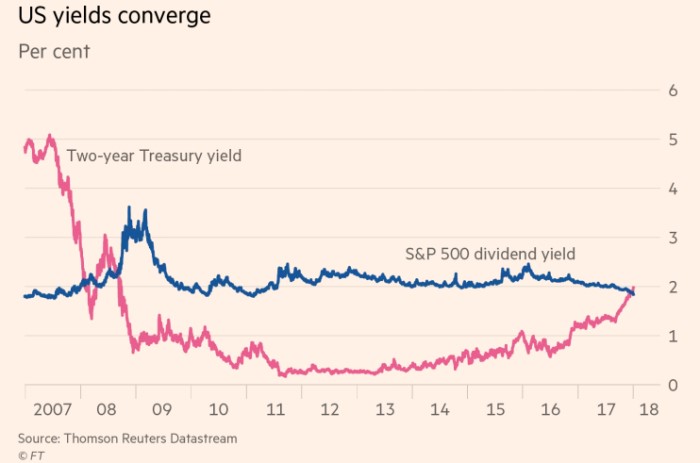U.S. equities markets have been very tepid this year, barely able to dig themselves out of a narrow trading range. After a nice climb in early May, the S&P 500 and the Dow Jones are in free fall once again as geopolitical turmoil in Europe roils the markets.
Not even dividend-paying stocks, which have become popular with investors in recent years, offer much reprieve. Treasury yields have been on a tear in recent months, with even the lower-yielding 2-year Treasury overtaking the S&P 500 average dividend yield for the first time in a decade. The 10-year Treasury currently yields 3.01 percent vs. 1.86 percent average dividend yield by the S&P 500.

(Click to enlarge)
Source: Financial Times
Given such a backdrop, it's easy for equities investors to start drooling at fixed-income assets such as Treasuries notes and bonds.
That seems like a no-brainer, but that's only part of the narrative.
Why Buying Both Stocks and Bonds Makes Sense
Investors are often advised to follow the 60/40 rule--i.e. have 60 percent of your portfolio in stocks and 40 percent in bonds. That's because stocks offer better opportunities for capital growth while bonds offer a steady source of income and a measure of downside protection against stock market sell-offs.
It's easy, however, for investors to simply look at yields but ignore bond prices. Rising interest rates have been depressing bond prices. The iShares 20+ Year Treasury Bond ETF (TLT), an ETF that tracks long-term Treasury notes, is down nearly 4 percent in the year-to-date. Depending on how quickly interest rates climb, an investor could end up losing a large amount of his or her principal when the bonds eventually mature. Related: Tesla “Autopilot” Crashes Into Police Car
Another note of caution, too: Although bonds are flashing considerably higher yields than equities, bond yields are still far lower than their pre-financial levels.

(Click to enlarge)
Source: Bloomberg
The differential between bonds and equities is still quite small compared to historical levels, thus making sense to still own stocks.
In fact, it would be a bad idea for long-term investors, savings minded individuals, pension funds and college endowment funds to completely offload their stocks and buy Treasuries.
There's a fair chance that bond yields will continue to rise further and/or stocks will fall. It makes sense to trim your exposure to equities when that happens.
Morgan Stanley thinks stocks still have some gas left in the tank and can mount a rally before peaking during the second half of the year with a series or rolling tops (read: lots of volatility) expected during the year.
Only 2 percent of fund managers expect a recession to kick in the current year, with 84 percent predicting a downturn in 2020.
For very long-term equities investors, the outlook is good. Tom Lee of Fundstrat Advisors expects the bull run to continue for another decade till 2029.
Related: Are Gold Markets Ignoring Geopolitical Risk?
The long and short of it: It doesn't make a lot of sense to sell your stocks and buy bonds right now, though it might in the future.
Avoid Junk Bonds
For those who need to load up on bonds, not everything goes in this space. It's better to stick to lower-yielding but safer investment-grade bonds instead of buying junk bonds for their high yields.
In fact, Moody's recently fired a warning against buying junk bonds saying that the risk of default is too high.
In this market starved of decent yields, investors have understandably been piling in on speculative high-risk bonds. This is a worrying trend given that company debt has also been surging. If you must buy junk bonds, limit your exposure.
By Alex Kimani for Safehaven.com
More Top Reads From Safehaven.com
















